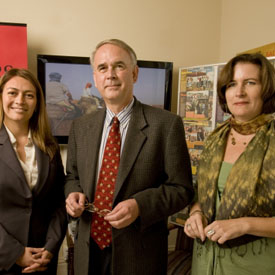
In a remote Romanian village, Kira Berstecher ventured inside crude, makeshift huts to meet with Gypsy, or Roma, families.
“They let us in their homes and showed us how they live,” said Berstecher, a senior attending Rutgers’ School of Social Work on the Camden Campus. “It was amazing to see. You have multiple generations living in the same household.”
In the Bolivian city of Cochabamba, meanwhile, Natasha Bennett, a junior in New Brunswick, helped organize a group of ambulantes – struggling women street vendors.
“They were skeptical of us at first,” said Bennett, who is majoring in political science and Latin American studies. “The more we got to talk, the more they started to trust us. It’s fair to say we became friends.”
Both students’ watershed experiences occurred over the spring and summer, when they participated in Rutgers Study Abroad programs.
Located on College Avenue in New Brunswick, the Study Abroad office provides students with an opportunity to travel internationally while earning academic credit. Students can enroll in over 40 overseas universities and faculty-led summer programs, from art history in Paris to Arabic-language classes in Morocco.
But the Bolivia and Romania programs could be the model for future initiatives.
In 2006, a university committee led by Joanna Regulska, now dean of international programs, and Isabel Nazario, associate vice president for academic and public partnerships in the arts and humanities, recommended expanding Study Abroad opportunities, particularly programs known as international service learning, or ISL.
And in his 2008–2009 “Strategic Goals for Rutgers University,” Rutgers President Richard L. McCormick called on the university to create a cluster of international service learning programs.
ISL essentially comprises three phases. Students begin with a preparatory course, focusing on the academic themes connected to the host community they will visit. Upon their arrival abroad, they become immersed in the day-to-day life of the citizenry, including working on community-development projects. On their return, they revisit their experience in workshops and seminars.
Stephen Reinert, the dean of Study Abroad, said the Bolivia and Romania programs are similar to ISL because they expose students to the daily realities and complex, underlying problems of an area, while grounding them in its history, culture, and politics.
“It’s not just academic coursework – it’s intense emotional engagement,” Reinert said. “The students know the reality of poverty, up close. They comprehend quite deeply the causes of human suffering. They experience the joy of making a difference, in working to solve critical problems. That is what service learning is all about.”
The 13 undergraduates in the Bolivia group, who left the United States on July 1, stayed in the homes of Cochabamba residents, worked alongside community members on a construction project, and volunteered in orphanages. They also explored larger, societal issues involving law, justice, and human rights.
There were many joyful moments, like the time some residents approached three students and invited them to a birthday party.
“The students were just blown away,” said Daniel Goldstein, who led the group and is an associate professor of anthropology and director of Rutgers’ Center for Latin American Studies.
Bennett said the six-week journey continues to inform her life on a philosophical, intellectual, and personal level.
“It put it into perspective how disconnected our own culture is,” she said. “You can send a text message, but a text won’t actually replace a conversation. I came back wanting to make better friends with those I had.”
The 11 undergraduate and graduate students, who left for Romania on May 26, also had a range of striking experiences that included examining the country’s budding social work institutions, witnessing crushing poverty, and seeing a particularly appalling form of racism aimed at the Roma population.
Indeed, Berstecher said, she was in a cab in Hungary when she pointed out a Roma family in their distinctive tribal clothing.
“The taxi driver said, ‘That’s not a person; it’s a Roma,’ ” she said. “It took my breath away. I’ve never seen racism so bluntly.”
The four-week trip, led by Rebecca Davis, director of Rutgers’ Center for International Social Work, was centered in Cluj and provided students with an opportunity to analyze the development of social work institutions since the communist era.
“Students are able to see how services for vulnerable populations have been transformed,” said Davis, who lived in Romania for 10 years and has written extensively on the social work system there. “Not only do we see the services, but we are also interacting with the social workers and the people receiving the services.”
Study Abroad aims to have ISL programs in Costa Rica, Mexico, Peru, and Thailand, as well as faculty-led summer programs in Costa Rica, Bolivia, Mexico, Romania, Greece, and Ghana, by summer 2011.